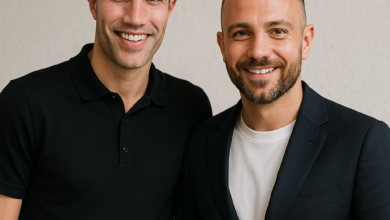Tragic news ; Former Feyenoord Striker Michael Obiku Shot at His Apartment in Shocking Attack
Former Feyenoord Striker Michael Obiku Shot at His Apartment in Shocking Attack

Former Feyenoord Striker Michael Obiku Shot at His Apartment in Shocking Attack
Rotterdam, Netherlands – A Shocking Night for Feyenoord Fans
In a tragic and deeply unsettling incident, former Feyenoord striker Michael Obiku was shot at his apartment in Rotterdam late last night. The 56-year-old Nigerian football legend, best known for his time with Feyenoord in the 1990s, was rushed to the hospital in critical condition after neighbors reported hearing multiple gunshots from his residence.
Authorities have launched an immediate investigation into the attack, with the police stating that they are pursuing several leads. At this time, no suspects have been arrested, and the motive behind the shooting remains unclear. Feyenoord fans, the Dutch football community, and Nigerian football supporters have been left in shock by the news.
The Incident: A Quiet Evening Turned Tragic
According to early reports, the shooting occurred around 10:30 PM local time in the Kralingen neighborhood of Rotterdam, an area known for its mix of residential and student housing. Witnesses claim they heard a series of gunshots followed by the sound of screeching tires as a car sped away from the scene.
“I was watching television when I heard the shots,” said a neighbor who wished to remain anonymous. “At first, I thought they were fireworks, but then I heard a man shouting in pain. That’s when I knew something terrible had happened.”
Emergency services arrived within minutes, finding Obiku bleeding heavily from multiple gunshot wounds. Paramedics performed emergency treatment at the scene before rushing him to a nearby hospital, where he was immediately taken into surgery.
Who is Michael Obiku? Feyenoord’s Cult Hero
For Feyenoord supporters, Michael Obiku is more than just a former player – he is a legend who left a lasting impact on Dutch football. The Nigerian forward joined the Rotterdam-based club in 1992 and played a crucial role in their attack, helping them win multiple domestic titles.
Obiku’s career was marked by his skill, pace, and an eye for goal. He played a key role in Feyenoord’s Eredivisie title win in 1993 and their KNVB Cup victories in 1994 and 1995. His celebration style, which included his signature somersault, became iconic among fans.
Before moving to the Netherlands, Obiku played for ACB Lagos in Nigeria and then moved to Greek club Anorthosis Famagusta, where he gained international attention for his incredible goal-scoring ability. After his time with Feyenoord, he had stints in Japan and Cyprus before eventually retiring and turning to coaching.
In recent years, he has remained close to Feyenoord, serving as an ambassador and working with the club’s Soccer Schools program, where he helped train young talent. He was also involved in community projects in Nigeria and the Netherlands, using football as a tool to uplift underprivileged youth.
Investigation Underway: Police Searching for Suspects
The Rotterdam Police Department has confirmed that they are treating the incident as a targeted attack but have yet to determine a clear motive. Investigators are currently reviewing security camera footage from the area, and forensic teams have been collecting evidence from the scene.
“We are taking this case very seriously,” said police spokesperson Johan de Vries at a press conference this morning. “At this moment, we do not have a suspect in custody, but we are following multiple leads. We urge anyone with information to come forward.”
There are several possible theories as to why Obiku was attacked. Some

















